bodycamera
Latest
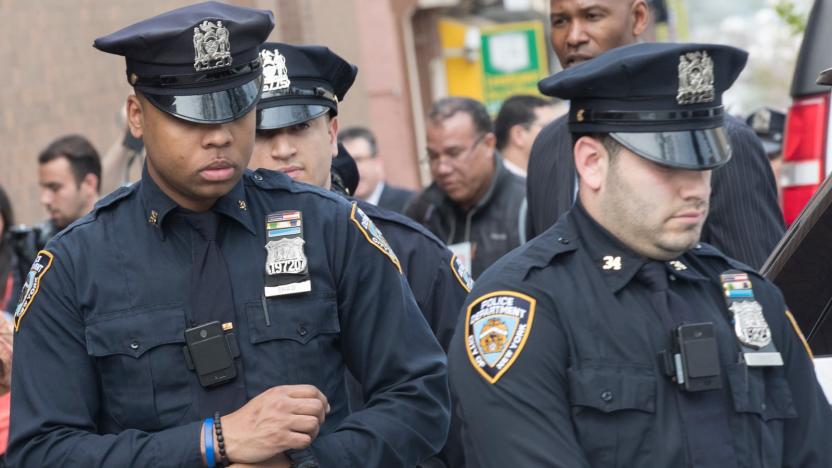
NYPD pulls 2,990 body cameras after one catches fire
The NYPD's plan to outfit every officer with body cameras has run into trouble. The department has pulled about 2,990 Vievu LE-5 cameras across the city after one officer's camera caught fire near a Staten Island precinct. There's a "possible product defect" with the LE-5, the NYPD said in a statement, and it was removing existing models out of an "abundance of caution." Most of the force's 15,500 cameras (including LE-4 models) aren't affected.
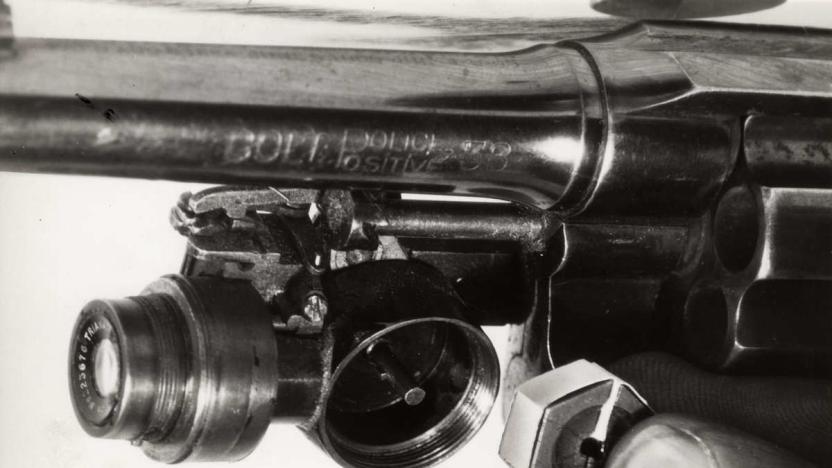
When body cams had bullets
Just as GoPros have given us a whole new perspective on everything from extreme sports to animal behavior, so have body-worn cameras offered new insights into policing. Law enforcement agencies around the world now use body cams to record the activities of officers in the field, though they've only become commonplace in the last few years. But the idea of documenting the volatile situations officers can find themselves in -- providing both evidence against offenders and holding police accountable for their actions -- is much, much older. The first attempts were very different from the body cams of today, however, as releasing the shutter required pulling the trigger of the gun the camera was attached to.

Axon opens ethics board to guide its use of AI in body cameras
Axon (formerly Taser) is keenly aware of the potential for Orwellian abuses of facial recognition, and it's taking an unusual step to avoid creating that drama with its body cameras and other image recognition systems. The police- and military-focused company has created an AI ethics board that will convene twice per year (on top of regular interactions) to discuss the ramifications of upcoming products. As spokesperson Steve Tuttle explained to The Verge, this will ideally establish a set of "AI ethics principles" within police work where certain uses are off-limits.
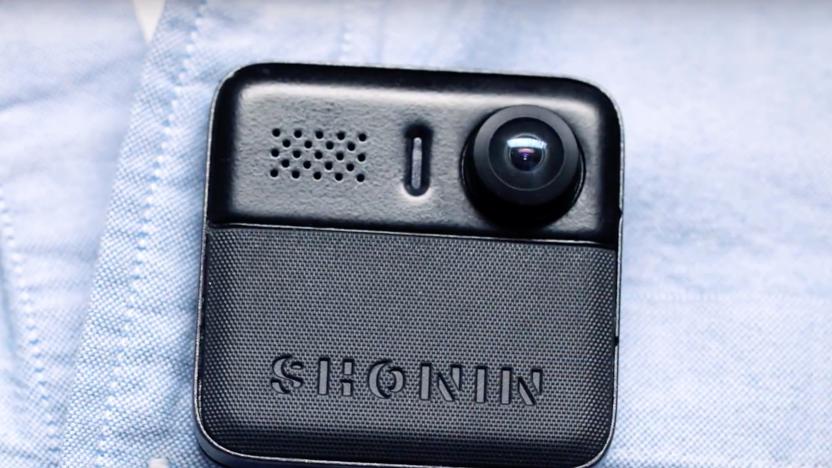
Shonin’s wearable Streamcam simplifies personal security
In times like these, you learn to keep yourself safe with what you have on hand. Whether that's broadcasting to Facebook Live, Periscope or Instagram, people have been using their phones to capture video for the world to see. The problem is that uploading live video takes a serious toll on your handset's battery. That's where Shonin's Streamcam comes in. Billed as a wearable security camera -- not a life-logging device -- the gizmo has a swath of features designed to help keep you safe without draining your phone's battery.

NYPD details its body camera policy ahead of spring pilot program
After four years of legal wrangling, input from 5,000 active duty officers and 25,000 members of the public, the long-awaited NYPD body camera pilot program is set to begin at the end of the month. On Friday, the department unveiled the rules by which its officers must abide when wearing the new devices and, unlike the 2013 Stop and Frisk case that led to their implementation, these new policy guidelines are surprisingly responsible.
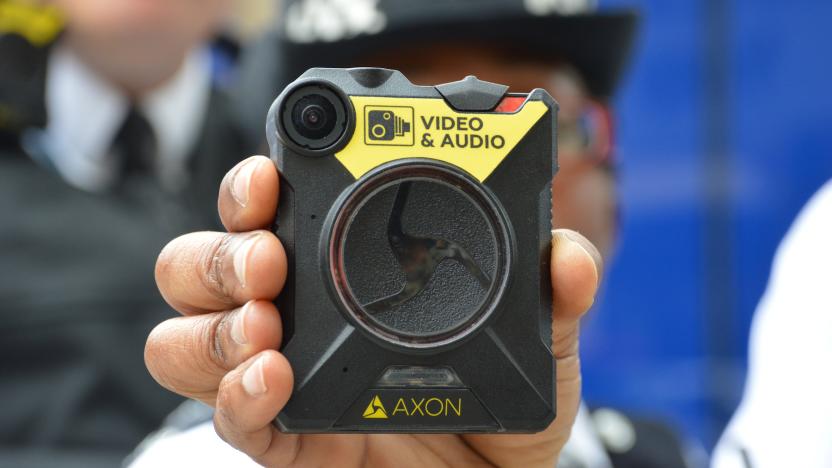
Body cameras will be given to 'over 22,000' London police
To help keep the peace, more than 22,000 London police officers will soon be given body cameras. The roll-out begins today -- six months later than former mayor Boris Johnson had anticipated. The new hardware, supplied by Taser, won't be recording around the clock; instead, officers will need to hit the shutter manually and notify the public "as soon as practical." A red light and beeping noise will indicate new recordings. The footage will then be uploaded to a secure server where it can be used as evidence in court. If it's not required, the data will be deleted automatically after 31 days.
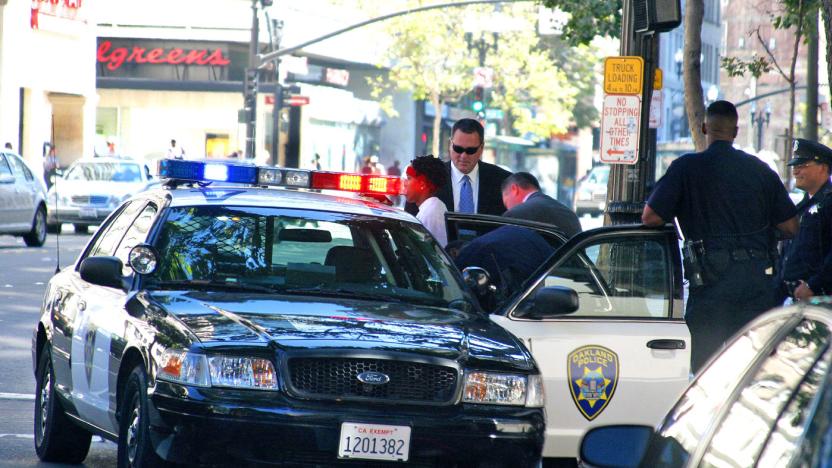
Big data shows racial bias in police behavior
Stanford University just delivered further proof that massive, readily available data sets can solve tricky law enforcement problems. School researchers combing through a mix of 28,119 Oakland Police Department stop reports, officer body camera footage and community surveys have learned that there are "significant" racial biases at play. OPD officers are not only more likely to stop a black person, but far more likely to conduct searches of black people, even though they weren't any more likely to find something incriminating. Officers more frequently handcuffed black people without arresting them, too. And the pattern is the same regardless of the crime rate in a given region.

Seattle Police's hacker leaves the force
The hacker who helped the Seattle police department work on its transparency has left the force. Tim Clemans will no longer be developing auto-blurring software for dash-and-body cameras at the department due to what sounds like some politics between himself and leadership. It's something that Clemans actually predicted, according to The Stranger. The problems apparently started gestating as recently as August when one of the department's captains made a complaint that any and all changes to the 911 dispatch center needed his approval before being implemented. You see, Clemans developed an app that would highlight the most serious emergency calls automatically -- something the captain felt usurped his power despite it making dispatchers' jobs easier. Other staff members voiced their support saying Clemans had done "a tremendous job" with his work, lamenting his departure.

Hillary Clinton wants all police to wear body cameras
Police body cameras might just represent a big talking point in next year's US elections. Presidential candidate Hillary Clinton tells those at a policy forum that she wants "every department" to issue the wearables to their officers. While a White House taskforce has already recommended the technology, Clinton believes that the implementations should "go even further" in certain circumstances. As she argues, there's a pattern of cops abusing their power across the country -- body cameras should encourage accountability and transparency.

White House offers $263 million in funding for police body cameras
In case it wasn't glaringly clear, police accountability is a major concern these days -- and the White House is convinced that technology can help solve the problem. It's now promising up to $263 million in matched funding for law enforcement agencies that want to buy body cameras for their officers. About $75 million of the fund is for purchasing the cameras themselves (up to 50,000 of them); the rest is devoted to storage, training and outreach programs meant to renew the level of trust between cops and the communities they serve. This is just one part of a much larger solution that also includes an overhaul of how the government distributes military gear, but it could make a big difference if it provides video evidence whenever there are complaints of excessive force or rights abuses. [Image credit: Aaron P. Bernstein/Getty Images]

Seattle police get help publishing body camera videos online
The police aren't often fond of publishing body camera and dashcam footage online, but not necessarily for nefarious reasons -- the volume of privacy-focused video editing they require can prove overwhelming. In Seattle, for example, a flood of public disclosure requests from an anonymous programmer (known by his "policevideorequests" handle) risked scuttling a body cam trial run before it got off the ground. However, that one-time antagonist is now coming to the city's rescue. The man has agreed to help Seattle's police department publish video by showing them how to quickly redact clips and get them online. As the unnamed person explains, it should mostly involve ready-made tools; the police will strip audio from clips using free software and lean on YouTube's automatic face blurring to protect identities.




